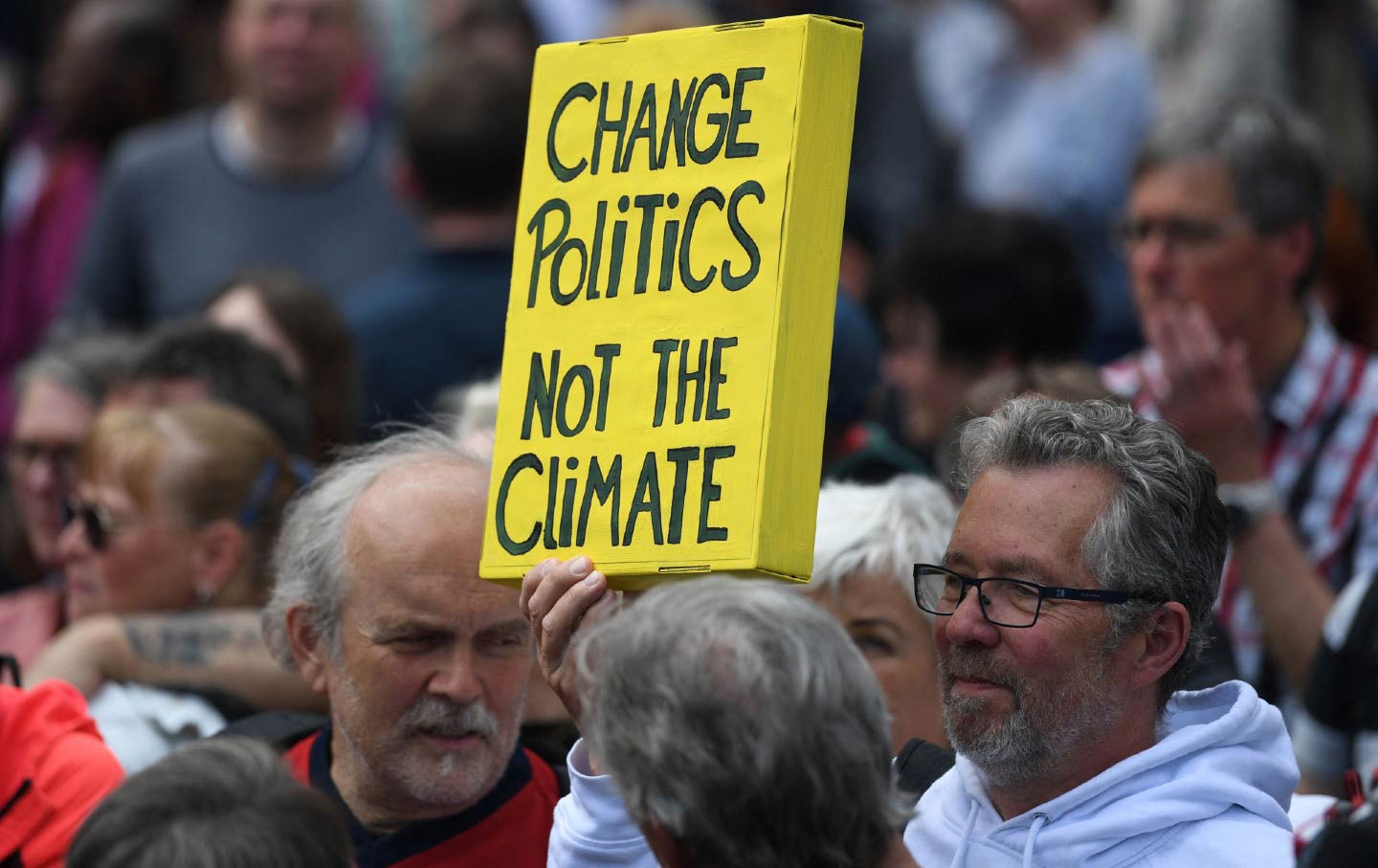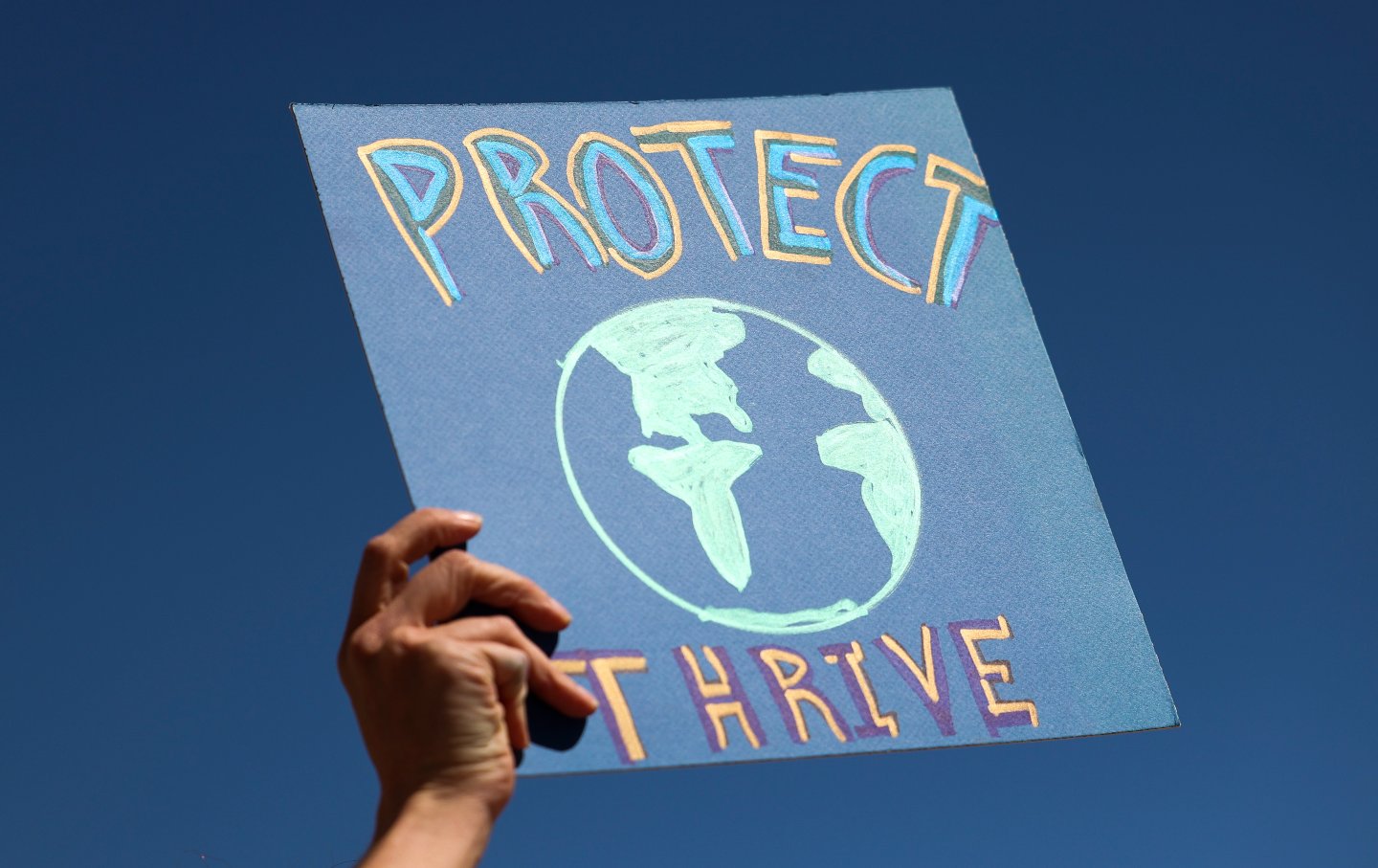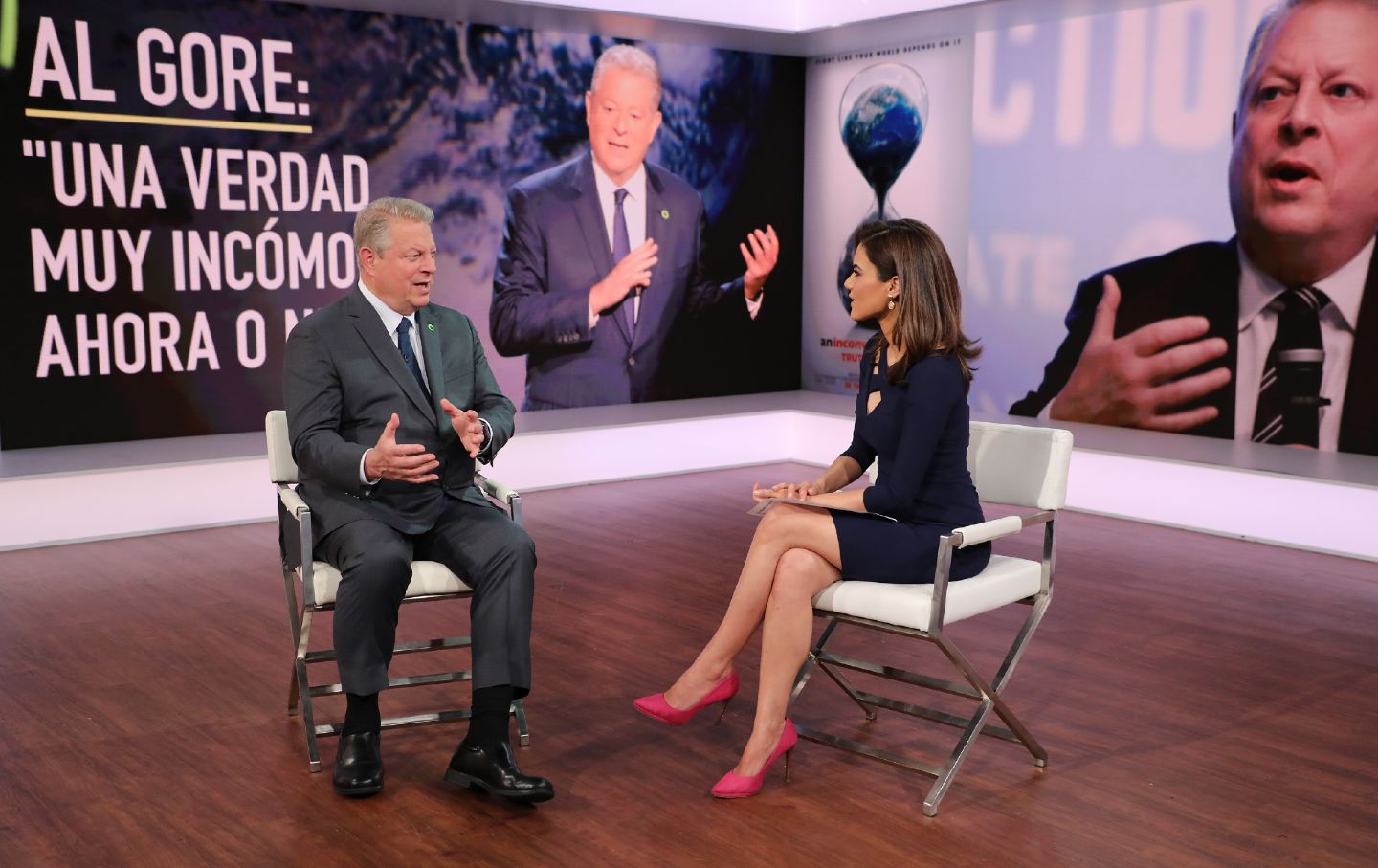The Game-Changing Truth That Could Save the Planet
Dispelling the myth that climate action is unpopular could push the world over a social tipping point and lead to unstoppable progress.

A demonstration prior to Germany’s Social Democratic party’s final campaign meeting for the Bremen state elections in Bremen, northwestern Germany, on May 12, 2023.
(Carmen Jaspersen / AFP via Getty Images)How much of a $450 pot would you give to a charity that cuts carbon emissions by investing in renewable energy, and how much would you keep for yourself? That was the question posed in a recent academic experiment. The answers mattered: Real money was handed out as a result to some randomly chosen participants.
The average person gave away about half the money and kept the rest. But what if you had been told beforehand that the vast majority of other people think climate action is really important? Might you have given more to the charity?
That is what a second experiment tested. Before dividing the cash, these participants were told that 79 percent of people thought citizens should try to fight the climate crisis. This mattered, because in earlier questions people had significantly underestimated the proportion at just 61 percent. Being informed about the true level of support boosted the donations by $16 per person.
The experiment was in the United States, but the illusion that climate action is not popular is global. So imagine dispelling that myth: Such a change, say experts, could be a game-changer, pushing the world over a social tipping point into unstoppable climate progress.
Such a communication campaign—low-cost and scalable—could be among the most powerful tools available to fight climate change, they say. Psychological research through decades has shown that correcting such misunderstandings can change people’s views across a swath of issues, from participating in protests to voting for Donald Trump.
“We’re sitting on an enormous potential climate movement,” said Anthony Leiserowitz, a professor of climate communication at Yale University. “It’s latent. It hasn’t been activated or catalyzed. But when you break through these perception gaps, you help people understand that they’re not alone and there is in fact a global movement.”
Silent Majority
The research started with a simple goal, said Teodora Boneva, a professor of applied microeconomics at the University of Bonn, Germany, who with colleagues undertook the experiments: “We wanted to make a difference to the world. So we asked ourselves, as social scientists and economists, what kind of research can we do?”
Their biggest result was a huge, globe-spanning survey that revealed the remarkable fact that people across the world are united in wanting action to fight the climate crisis but remain a silent majority, because they wrongly think only a minority share their views.
“Before, just like everyone else, we would have underestimated the support,” she said. “So when we saw the numbers coming in, we thought, wow!” she said. “We had no idea we would find such consistent patterns in so many countries.”
The team found that 89 percent of people across the world wanted their national governments to do more to fight global warming. Over two-thirds then said they were willing to give 1 percent of their income to fight climate change. Crucially, however, they thought only a minority of other people—43 percent—would be willing to do the same.
The survey involved 130,000 people in 125 countries, which account for 96 percent of the world’s carbon emissions, and was published in the journal Nature Climate Change. People in China, the world’s biggest polluter, were among the most concerned, with 97 percent saying its government should do more to fight climate change and four in five willing to give 1 percent of their income. The world’s second-biggest polluter, the United States, was near the bottom, but still had three-quarters of its citizens saying its government should do more and almost half willing to contribute.
Even in the petro-states of Saudi Arabia and UAE, the vast majority—about 80 percent—were willing to give 1 percent of their income to climate action. How many of these wanted more government action is unknown—these countries did not allow the question to be asked.
Those feeling the heat most directly had the strongest pro-climate views. Those in rich countries were significantly less willing to contribute 1 percent. And the countries where people most strongly wanted to fight the climate crisis had implemented significantly more climate policies, the researchers found. The more strongly people believed their fellow citizens would contribute their money to climate action, the more likely they were to give themselves, as Boneva’s later experiments with the $450 pots showed.
“These positive interactions suggest that a change in one factor can unlock potent, self-reinforcing feedback cycles, triggering social-tipping dynamics,” the team concluded. “Our results suggest a concerted effort to correct these misperceptions could be powerful intervention, yielding large, positive effects.”
Deep Desire
A single survey, like Boneva’s, is fascinating—but perhaps you are thinking it could be a freak result. It is not. Many major studies have shown that the public desire for climate action is deep and global, and that the misperceptions that fuel a “spiral of silence” on climate are found wherever researchers look.
A large UN poll in 2024—dubbed the People’s Climate Vote—questioned 75,000 people in countries representing 90 percent of the global population. It found that 80 percent wanted their countries to strengthen their climate change commitments. Another recent survey of 40,000 people in 20 of the world’s most polluting countries found that 86 percent of people thought the same.
How the question is phrased can change, but people’s hunger for climate action does not. A survey of 140,000 people in 187 countries by the Yale Program on Climate Change Communication asked how high a priority climate change should be for the government of their country: Eighty-nine percent of people said very high, high, or medium, with 67 percent saying very high or high.
The perception gaps are real too. A US study from 2022 found that people thought only about 40 percent of their fellow citizens supported major climate policies: The real proportion was about 75 percent. An earlier study found the same in China.
Other commonly held beliefs have been revealed as false, including the idea that people in rich nations are unwilling to give money to poorer nations to help fight the climate crisis. A study testing support for the redistribution of money from a global emissions trading scheme from the rich to the poor found the scheme was backed by 76 percent of Europeans and 54 percent of those in the United States.
“There is a silent majority in favor of [action on] climate change,” said Adrien Fabre, a researcher at the International Center for Research on Environment and Development in France, who led the study. “Making people aware of this would help a lot and bring hope. I think a lot of people are self censoring and not fighting or voting [for climate action] because they think that their ideas are not in the zeitgeist.”
“There is also majority support for global redistribution policies, even among people in high-income countries who understand that they would have to pay for it,” said Fabre. “This is because people attach value to the human rights and well-being of fellow human beings and to a stable climate.”
But is this huge support for climate action in surveys actually sincere, or is it just people saying what they think the researchers want to hear?
Fabre, Boneva, and other academics routinely test the reliability of information from surveys using numerous tools. These include comparing people’s answers to their real-world behavior—for example, finding correlations between people’s stated willingness to pay money for climate action and their actual donations to climate charities.
Other tests link their answers to real-world consequences, such as telling them their answers would be sent to the government, or by hiding the climate questions among others so the respondents cannot guess the “right” answer.
In any case, Fabre said: “Polls are rarely wrong by more than 5 percent.” That can make a big difference in tight elections, but not when talking about large majorities such as the 89 percent wanting more climate action from their governments.
Political Illusions
Do you think politicians suffer under the same illusions about the popularity of climate action as the public? You might think their political antennae are finely tuned to public opinion, but they are not—sometimes wildly underestimating public views. And that matters, said Niall McLoughlin, a codirector of Climate Barometer, which analyzes climate opinions in the United Kingdom.
The group found in 2024 that 72 percent of the UK public supported the building of onshore windmills in their areas, but only 19 percent of MPs thought a majority of their constituents did so. “That was a barrier to the approval and roll out of developments,” the analysts concluded. Similar results have been found in the US Congress on carbon regulations.
Popular
“swipe left below to view more authors”Swipe →Climate action is backed even by those who vote for political parties that are explicitly opposed to it, according to the UK’s More in Common think tank. The right-wing populist Reform UK Party recently labeled climate concern “hysteria” but 62 percent of the people who voted for the party in 2024 said it was important that the government cares about tackling climate change.
The apparent contradiction results from very few (4 percent) Reform voters’ saying the party got their vote because of its environmental policies. Instead, 72 percent said it was because of its hard-line anti-immigration policies.
Boneva said: ‘Informing the policy debate on climate issues can be very helpful. If we make politicians more aware of what the people in their country want, they might actually act on the people’s preferences.”
Social Creatures
Most people are social creatures, highly influenced by what others do and say. That is why correcting mistaken beliefs about the views of your fellow citizens can make an impact on what you think and do. There is a lot of research showing this can shift people’s views on a range of social justice issues.
First, people are drawn toward “social norms,” the perceived standard of acceptable behavior. “There is a really strong motive among people to try to adhere to what they think is socially desirable,” said Boneva. “This has been shown in many, many different contexts.”
People are also “conditional cooperators”: They are more likely to contribute to the public good if they think others are doing the same. “This motive has also been studied very extensively,” Boneva said. “If everyone else in a shared home is cleaning the dishes, you will do it too. If everyone else is just leaving their stuff, you won’t bother either.”
Studies have shown that telling people how popular environmental action is with others can increase their own actions, for example in saving energy and green living. Correcting misperceptions among US citizens about the climate views of people in China increased support for a climate treaty.
But studies specifically on green issues are relatively rare and have shown mixed results, said Sandra Geiger, a postdoctoral researcher at Princeton University. Her soon-to-be published work in 11 countries showed a small increase in people’s willingness to talk about climate change when they were told a majority agreed with them.
That could be important, she said: “Correcting these misperceptions can disrupt this spiral of silence. If you then believe that a majority agrees with you, you’re more likely to talk about the issue and this, in turn, corrects misperceptions in other people.”
But correcting the misperception did not lead people to put more priority on government climate action or living greener lives themselves, Geiger said. Another recent study in 63 countries found that correcting misperceptions had no impact on people’s climate views, as did another on the acceptance of carbon taxes.
The impact of dispelling mistaken views might depend on how it is corrected—for example, by using stories rather than data or correcting repeatedly, not just once. “We haven’t really found out yet,” said Geiger. Other barriers might also remain, such as entrenched ideologies.
But she highlighted one approach clearly shown to work—correcting people’s misperception about the proportion of climate scientists that agree that global heating is human-caused and a serious problem, which is extremely high.
Despite the varying results to date, Geiger still backs campaigns to correct misperceptions: “People deserve to know and campaigns are cheap and scalable.”
Breaking the Silence
Why do these collective illusions about the level of support for climate action exist at all? What is the root cause? The answer remains uncertain but is likely to be a complex mix of human psychology—people tend to think worse of others than of themselves, for example—and fossil-fueled disinformation.
“One reason is just fundamentally human, because we can’t easily read the hearts and minds of our fellow human beings,” said Leiserowitz. “It’s made doubly hard because climate change is an issue that is abstract and often cloaked in scientific information.
“A third critical reason is the existence of a very large, sophisticated, well-funded, and long-standing misinformation campaign being driven by the fossil-fuel industry and its allies, sowing doubt and division to maintain their profits.”
This campaign has acted as an “enormous megaphone” for the small but vocal minority that dismiss climate change—about 10 percent in the United States—he said: “As a result, they tend to dominate the public square. Climate change has joined sex, religion, and politics as taboo topics at the Thanksgiving Day table. So communicating social norms is one of the most powerful interventions you can make.”
What about today’s rapidly changing geopolitics, with rising nationalism, Trump entrenching climate denial in the United States, and the threat of trade wars and recessions? This makes the data on people’s real climate views more important than ever, said Cassie Flynn, the global director of climate change at the UN Development Program, which ran the People’s Climate Vote.
“People are actually very multilateral,” she said. “The result that always sticks with me is this: Eight-six percent of people thought that countries should put aside their differences on other issues and work together. People understand our fates are tied together when it comes to the climate crisis and they want world leaders to act on it.”
And everyone can help break the “spiral of silence,” according to Cynthia Frantz, a professor of psychology and environmental studies at Oberlin College: Change “simply requires that people be exposed, over and over, from sources they trust or identify with, to the fact that they are not alone in their concern and their willingness to take action.”
Frantz added, “The empowering truth is that every public statement counts, and the more diverse the voices, the more effective the message will be.”








